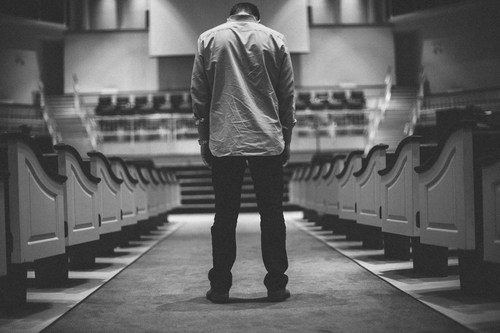“A Better Mountain” – Hebrews 12:18, 22 – November 8 2020
/0 Comments/in Enduring Words for Troubled Times/by David GuzikSeven Signs in the Gospel of John 7: The Resurrection and the Life – November 7 2020
/0 Comments/in Enduring Words for Troubled Times/by David GuzikSeven Signs in the Gospel of John 6: Healing of a Man Born Blind – November 6 2020
/0 Comments/in Enduring Words for Troubled Times/by David GuzikSeven Signs in the Gospel of John 5: Here Comes Jesus – November 5 2020
/0 Comments/in Enduring Words for Troubled Times/by David GuzikSeven Signs in the Gospel of John 4: Bread from Heaven – November 4 2020
/0 Comments/in Enduring Words for Troubled Times/by David GuzikSeven Signs in the Gospel of John 3: Because Jesus Wanted To – November 3 2020
/0 Comments/in Enduring Words for Troubled Times/by David GuzikSeven Signs in the Gospel of John 2: A Deeper Belief – November 2 2020
/0 Comments/in Enduring Words for Troubled Times/by David GuzikThe Preacher’s First Word
/0 Comments/in Weekly Devotional/by David GuzikThen Peter said to them, “Repent, and let every one of you be baptized in the name of Jesus Christ for the remission of sins; and you shall receive the gift of the Holy Spirit.” (Acts 2:38)
When a crowd asks an evangelist “What shall we do,” a good evangelist will never miss the opportunity to tell them to respond to Jesus Christ. That’s exactly what happened in Acts 2 when Peter preached to the multitude at the Feast of Pentecost.
Peter must have been pleasantly amazed to see what God had done in this situation. Instead of people wanting to crucify him because of Jesus, thousands of people wanted to trust in Jesus as Lord and Messiah.

Here is what Peter told them: Repent, and let every one of you be baptized. Responding to the question, what shall we do? (Acts 2:37) Peter gave them something to do. This means that we must do something to receive salvation, we must do something to follow Jesus; it doesn’t just “happen.”
Peter did not say to the crowd, “There’s nothing you can do. If God saves you, you’re saved. If God doesn’t save you, you’ll never be saved.” Though it is true that only God could do the saving, the people had to receive through repentance and faith, faith leading to action such as baptism.
The first thing Peter told them to do is repent. To repent does not mean to feel sorry, but it means to change one’s mind or direction. They had thought a certain way about Jesus before, considering Him worthy of death on a cross. Now they must turn their thinking around, embracing Jesus as Lord and Messiah.
Repent sounds like such a harsh word in the mouths of many preachers and in the ears of many listeners, but it is an essential aspect of the gospel. Repent has been rightly called “the preacher’s first word.”
When John the Baptist preached he said, Repent, for the kingdom of heaven is at hand! (Matthew 3:2). When Jesus began to preach He said, Repent, for the kingdom of heaven is at hand (Matthew 4:17). Now when Peter began to preach, he started with repent.
Repentance must never be thought of as something we must do before we can come back to God. Repentance describes what coming to God is. You can’t turn towards God without turning from the things He is against.
We can’t repent unless God works in us (2 Timothy 2:25), but God won’t repent for us. God works in and through the human will, and a person must respond to God’s invitation (often through a preacher) and say, “I will now repent.”
Repentance must be present at the beginning of our walk with God, but it doesn’t end there. We are to keep on repenting, as God shows us more and more to get right with Him. Today, think of how repentance can be an ongoing work in your life.
¿Qué haremos?
/0 Comments/in Devocional Semanal/by David GuzikAl oír esto, se compungieron de corazón, y dijeron a Pedro y a los otros apóstoles: Varones hermanos, ¿qué haremos? (Hechos 2:37)
Una gran multitud escuchó la enseñanza audaz del apóstol Pedro, y Dios hizo una obra extraordinaria por el poder del Espíritu Santo. Lucas, el autor del libro de Hechos, nos dice que al oír esto todos respondieron con una pregunta: “¿Qué haremos?” El pueblo judío que estaba en Jerusalén para la celebración de Pentecostés estaba tan conmovido que le preguntaron al predicador Pedro cómo debían responder.

Es incorrecto pensar que Pedro no dio un tipo de invitación o desafío a sus oyentes. Sabemos que lo hizo porque Hechos 2:40 dice: Y con otras muchas palabras testificaba y les exhortaba, diciendo: Sed salvos de esta perversa generación. Lo que leemos en Hechos 2 es un resumen, y Pedro claramente los exhortó a responder. Invitó a sus oyentes a ser salvos.
Aun así, la multitud mostró una respuesta asombrosa, preguntando ¿qué haremos? Se ha dicho que en las temporadas normales de trabajo cristiano el evangelista busca al pecador. Sin embargo, en tiempos de avivamiento o despertar, las cosas cambian: el pecador busca al evangelista. Este día de Pentecostés en Hechos 2 fue una de esas grandes temporadas de la obra de Dios. Cuando Dios está obrando en el corazón de alguien, ellos quieren venir a Él; actuarán para venir a Dios.
Cuando vemos como respondió la multitud, nos ayuda a poner en perspectiva los eventos de ese día de Pentecostés. El don de hablar en lenguas no produjo nada en quienes lo oyeron, excepto asombro y burla. No fue hasta que se predicó el evangelio que vino la convicción del Espíritu Santo. Esto era lo que Dios realmente quería realizar.
La gente respondió de esta manera porque se compungieron de corazón. Esta es una buena manera de describir la convicción del Espíritu Santo. Ahora sabían que ellos eran responsables por la muerte de Jesús (como lo somos cada uno de nosotros) y que tenían que hacer algo en respuesta a esta responsabilidad.
Cuando lo pensamos bien, Pedro tenía alguna experiencia previa con cortar. Cuando Jesús fue arrestado, Pedro le cortó la oreja derecha a uno de los hombres que vinieron a arrestar a Jesús (Juan 18:10). Todo eso fue un lío vergonzoso que Jesús después tuvo que arreglar. Juan 18:10 enseña a Pedro en su naturaleza carnal, haciendo lo mejor que pudo con una espada literal de poder humano.
Cuando el Jesús resucitado cambió la vida de Pedro y cuando el poder del Espíritu Santo descendió sobre él, él pudo cortar de una manera más efectiva: cortó corazones, abriéndolos a Jesús. Esto es lo que Pedro pudo hacer en el poder del Espíritu, haciendo lo mejor para Dios con la espada del Espíritu, la Palabra de Dios. ¿Qué espada fue la más poderosa?
¡Nunca dudes el poder que Dios tiene de cortar corazones y cambiar vidas!
Haz clic aquí para el comentario de David de Hechos 2




